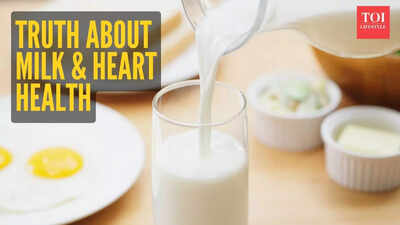ARTICLE AD BOX

For decades, full-fat milk has been seen as the “bad guy” in heart health discussions. It’s been blamed for raising cholesterol and clogging arteries. But a new long-term study offers a surprising twist: whole milk may not be as heart-hostile as it’s been made out to be.Researchers from the CARDIA (Coronary Artery Risk Development in Young Adults) study followed more than 3,000 participants for 25 years, starting in the mid-1980s. Their goal was simple: to see how dairy intake in early adulthood relates to coronary artery calcification (CAC), a buildup of calcium in arteries that often signals early heart disease.
Whole-fat dairy may protect, not harm
Out of 3,110 participants, 904 developed coronary calcium deposits over time. When the researchers compared eating habits, they found something unexpected, those who consumed more whole-fat dairy had a lower risk of developing CAC.To put it simply: participants who regularly drank full-fat milk or ate whole-fat yoghurt and cheese were less likely to show artery damage than those who consumed less dairy or stuck to low-fat options.This doesn’t mean milk is a miracle food, but it does raise questions about the blanket advice to always choose “low-fat.”

Why the fat in milk might not be the enemy
The old logic was straightforward, fat in milk equals more cholesterol, which equals more heart disease.
But the human body isn’t that simple.Whole dairy products contain a mix of fatty acids, some of which may actually help maintain good cholesterol (HDL) and lower inflammation, two factors that protect the heart.Scientists also noticed that people who consumed more dairy tended to have slightly lower body mass indexes (BMIs), suggesting that dairy might help with satiety and prevent overeating elsewhere in the diet.
So, should people switch back to full-fat milk?
Not so fast. While the study found a link between whole dairy and lower artery calcification, it’s important to remember that this is an association, not proof of cause and effect.Other factors, like diet quality, genetics, and physical activity, still play a major role in heart health.

As per the USDA, per 100 100 ml of cow milk offers 61 calories, 3.2 g protein, 3.3 g total fat, 1.9 g saturated fat, 4.8 g carbs, 4.8 g lactose, 113 mg calcium, 46 µg vitamin A, 10 mg magnesium, and 143 mg potassium.
Experts now believe the focus should shift from single nutrients like fat to the overall food pattern. Instead of demonising dairy fat, the bigger question should be: What’s the quality of the food it comes with? Is it part of a balanced, nutrient-rich diet, or is it paired with processed, high-sugar foods?This study challenges old dietary rules and reminds us that nutrition science evolves. Full-fat milk might not be the heart threat once feared, but moderation still matters.For most people, choosing milk, whether full-fat or low-fat, should depend on total calorie needs, lifestyle, and health goals.In short, enjoy milk, but let it be a part of a balanced plate, not the centerpiece of it.Disclaimer: This article summarises findings from the CARDIA study published in a peer-reviewed journal. It is intended for informational purposes only and should not replace medical advice. Individuals with heart disease, cholesterol issues, or other health conditions should consult a healthcare provider before making dietary changes.

 1 hour ago
4
1 hour ago
4








 English (US) ·
English (US) ·